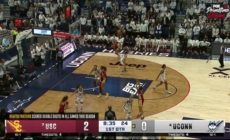-
The Circle of Light Closes and Illuminates the World - 23 mins ago
-
Texas, fueled by adversity and last year’s CFP loss, tops Clemson in playoff opener - 26 mins ago
-
College Football Playoff: Texas Eliminates Clemson, Will Play Arizona State in Peach Bowl - 46 mins ago
-
Juju Watkins drills a 3-pointer over Paige Bueckers, extending USC’s lead over UConn - about 1 hour ago
-
How To Get Your Steps in Over the Holidays, According to Personal Trainers - about 1 hour ago
-
Tom Brady's LFG Player of the Game: Ravens' Lamar Jackson | Week 16 DIGITAL EXCLUSIVE - 2 hours ago
-
Alpha Prime Racing Confirms Huge Crew Chief Signing For NASCAR Xfinity Series - 2 hours ago
-
2 U.S. Navy pilots eject to safety after friendly fire downs their fighter jet - 2 hours ago
-
JuJu Watkins and No. 7 USC hold off Paige Bueckers and fourth-ranked UConn 72-70 - 3 hours ago
-
Today’s ‘Wordle’ #1,282 Answers, Hints and Clues for Sunday, December 22 - 3 hours ago
Jack Smith Wants to Censor Donald Trump Documents
Prosecutors have asked a judge for “extensive” censorship of court papers in Donald Trump’s classified documents case.
Special Counsel Jack Smith wrote in a court brief to Judge Aileen Cannon that he wants to redact several papers and also remove the name and pronouns of government officials to protect their safety.
His censorship request is opposed by Trump and his two co-accused.
The former president is facing 40 federal charges over his handling of sensitive materials retrieved from his Mar-a-Lago estate in Palm Beach, Florida, after leaving the White House in January 2021. He is accused of obstructing efforts by federal authorities to return them. Trump has pleaded not guilty to all charges.
Newsweek contacted Trump’s attorney via email for comment on Tuesday.
Angela Weiss/Getty Images
Two former Trump employees, Walt Nauta and Carlos De Oliveira, are accused of moving boxes of sensitive materials around Trump’s Florida home to prevent federal agents from finding them and conspiring to delete security footage that had been sought under a subpoena.
Nauta and De Oliveira have pleaded not guilty to all federal charges against them, including conspiracy to obstruct justice. Newsweek contacted Nauta and De Oliveira’s lawyers for comment via email on Tuesday.
In his latest filing, Smith says that “witness safety and privacy are paramount pre-trial.”
He complained in previous filings that witnesses and court staff in other Trump cases have been intimidated and he doesn’t want a repeat of that in Trump’s classified documents case.
Smith also notes that Nauta’s lawyers quote from documents that have been sealed by a judge and which the public should not be allowed to read.
Smith has already sent a proposed censored version of the documents to Cannon and to the defense lawyers in the case.
Much of the censorship is of reply briefs submitted by Trump’s co-accused, Nauta.
Those briefs are in support of Nauta’s motion to dismiss the case, based on a claim of selective and vindictive prosecution and he and Trump’s motion to suppress evidence.
Trump, Nauta and De Oliveira all opposed Smith’s attempts to censor the documents.
“The government has conferred with counsel for all three defendants concerning this motion, and they maintain that the government has not met its burden to support restricting public access to the two reply briefs,” Smith’s latest court briefing states.
“There are three portions of Nauta’s selective/vindictive reply that require extensive redactions. First, beginning on page two of the reply and continuing through page four, Nauta references, summarizes, and quotes from filings that this court has ordered sealed. The Government does not object to the court unsealing these docket entries, but until it does so, these portions of the reply must be redacted,” Smith states.
Smith also alleges that Nauta’s lawyers are quoting from sealed grand jury evidence.
“Second, on pages four and five of the reply, Nauta references a sealed grand jury proceeding in the District of Columbia that occurred as part of this investigation and that involved another client of his counsel.”
Smith also claims that Nauta’s lawyers reference another grand jury case in which the lawyer was involved and, of which, Smith and his team have no knowledge.
“Last, page seven of the reply contains the names of potential government witnesses. The government seeks to redact their names. As the government has argued in its prior motions for redactions and/or sealing, witness safety and privacy are paramount pre- trial,” Smith states.
“Throughout Nauta’s motion to suppress reply, he includes the names of Government witnesses. The government is seeking to redact their names and any pronouns revealing their gender,” Smith adds.
He is joined in his filing by two lawyers in his office, Jay I. Bratt and David V. Harbach II.
Uncommon Knowledge
Newsweek is committed to challenging conventional wisdom and finding connections in the search for common ground.
Newsweek is committed to challenging conventional wisdom and finding connections in the search for common ground.
Source link






























